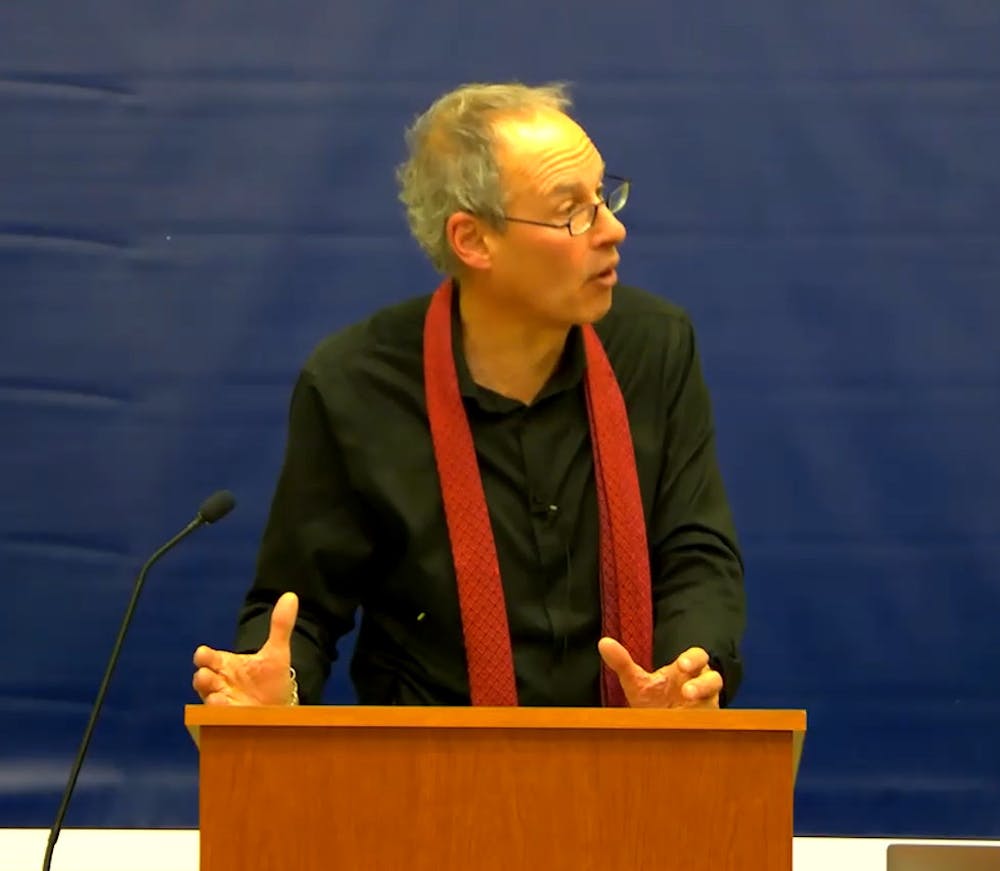The Rohatyn Center for Global Affairs (RCGA) hosted a talk on Oct. 20 by James Morone ’75, Middlebury alum and John Hazen White Professor of Public Policy at Brown University, entitled “Republic of Wrath: How American Politics Turned Tribal” after his most recent book published in 2020. This talk was the first event of the new RCGA program “Global Trends in Autocracy and Democracy,” sponsored by the Cangiano family.
Morone’s accolades include winning “notable book of 1991” by the New York Times, the American Political Science Association’s Gladys M. Kammerer Award for best book on national policy and a Pulitzer Prize nomination.
He began the talk with what he sees as the heart of the issue: Divisive partisanship is currently the most intense it has been in American history. Morone cited that former President Donald Trump, after losing the 2020 election by 7 million votes, claimed the results were invalid. He also said there are 345 officials now running for office claiming that the last election was illegitimate and stolen.
When Morone was a student at Middlebury in the early 1970s, 5% of Democrats and Republicans in the United States said they would be concerned if their child married across party lines — that statistic is now over 70%.
“What has changed now that makes our politics so vulnerable to partisanship?” Morone asked.
In a lecture complete with visuals, Morone guided the listeners through three major “acts” of American history, sprinkled with stories and personal anecdotes. He examined this history through the lens of “the two great culture wars” in the country’s nature, race and immigration.
America became an immigrant nation with a large and constant influx of people of different nationalities, according to Morone. The U.S. is designed in a way that makes fear of the “other” and the idea of “us vs. them” continuous, and public policy reflects this.
Through these history “acts,” Morone outlined how the original American political parties effectively divided the culture war issues. Conservative Federalists pushed to restrict immigration but supported racial rights. On the contrary, Democrats promoted immigration but were the party of white supremacy. The battles over immigration and race were heated, but separate.
These culture wars intensified when African Americans migrated to the north and began voting for Democrats. By 1964, 90% of African Americans were democrats, and the white vote shied away. President Johnson reopened the gate to immigration and advocated for bringing immigrants back into the Civil Rights movement as the Latino and Asian American votes also shifted towards democrats, Morone explained.
With these demographic changes and shifted political alignments, both parties were heavily incentivised to fight the culture wars. Voters began to see politics through this filter of race and immigration, and the gap in the parties’ preferred policy widened tremendously.
Morone emphasized the surge of inequality that has coincided with these divisions. Measures of economic inequality have shown a significant increase in inequality in the U.S. between 1970 and today, while countries such as Sweden, Denmark, Germany, Canada, France and Japan have all seen declines in inequality during the same time period.
Morone concluded with a spark of hope for the future. “There’s a whole new cohort always coming into American politics, and today that cohort is very, very different,” he said. “I’m optimistic, because I think my students are just more reliable as people with values than we ever were.”
“This new generation stands out because community is more important, volunteering is more important, conflict is looked down on more, they are much more open in terms of sexuality, gender identity, race and interracial marriage. I think it’s a much more tolerant, understanding and participatory generation,” Morone said.
Student attendee Prannoy Thakore ’25.5 shared why he was inclined to come hear Morone speak. “I’m a political science major, so I took [Charles A. Dana Professor of Political Science] Murray Dry’s class last semester and a lot of the questions I’ve had about political science started there. I am an American citizen, but I’m also an international student, so I’ve never really had a connection with the country — when you hear about all of these things in the news, eventually you have to go ahead and question it, and try to figure it all out,” he said.
Giving talks like this gives Morone the chance to tell stories and answer questions that let him see the topic in a different way. “Giving a talk at Middlebury is a whole separate thing, because I feel like I’m talking to the latest generation of people who are going through an experience that is different but also has a family resemblance to what I went through here,” Monroe added.
Sebnem Gumuscu — professor of Political Science, fellow of the Rohatyn Center and one of the directors of the new Global Trends in Autocracy and Democracy program — expressed excitement about the upcoming events the program will bring, including more guest lectures, panels, workshops and larger conventions.
On Nov. 15, the center will host a virtual talk by Staffan I. Lindberg, professor and director of the V-Dem Institute at the University of Gothenburg titled “Cause for Alarm? Global Data on Democracy and Autocracy.”

Madeleine Kaptein '25.5 (she/her) is a managing editor.
Madeleine previously served as a staff writer, copy editor and local editor. She is a Comparative Literature major with minors in German and Art History. In Spring 2024, she studied abroad in Mainz, Germany, from where she wrote for the Addison Independent about her host country. In her free time, she enjoys journaling, long walks and runs, and uncomplicated visual arts projects.




